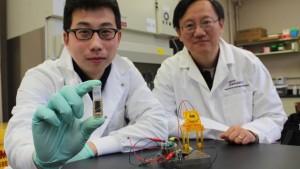
The researchers at Virginia Tech have successfully demonstrated the concept of a sugar biobattery that can completely convert the chemical energy in sugar substrates into electricity.
Credit: Virginia Tech University
According to new studies, the future of energy storage and conversion may be something that’s sitting in your kitchen cupboard.
A new breakthrough out of Virginia Tech demonstrates that a sugar-powered biobattery has the potential to outperform the current lithium-ion batteries on many fronts.
Not only is the energy density of the sugar-powered battery significantly higher than that of the lithium-ion battery, but the sugar battery is also less costly than the li-ion, refillable, environmentally friendly, and nonflammable.
This from LiveScience:
This nature-inspired biobattery is a type of enzymatic fuel cell (EFC) — an electrobiochemical device that converts chemical energy from fuels such as starch and glycogen into electricity. While EFCs operate under the same general principles as traditional fuel cells, they use enzymes instead of noble-metal catalysts to oxidize their fuel. Enzymes allow for the use of more-complex fuels (such as glucose), and these more-complex fuels are what give EFCs their superior energy density.
The scientists hope to increase the power density, extend the lifetime, and reduce the cost of electrode materials in order for this energy-dense sugar biobattery to become the technology of the future.
Find the full findings in this issue of Nature Communications.
Learn more about this topic by reading a recently published open access article via ECS’s Digital Library.

